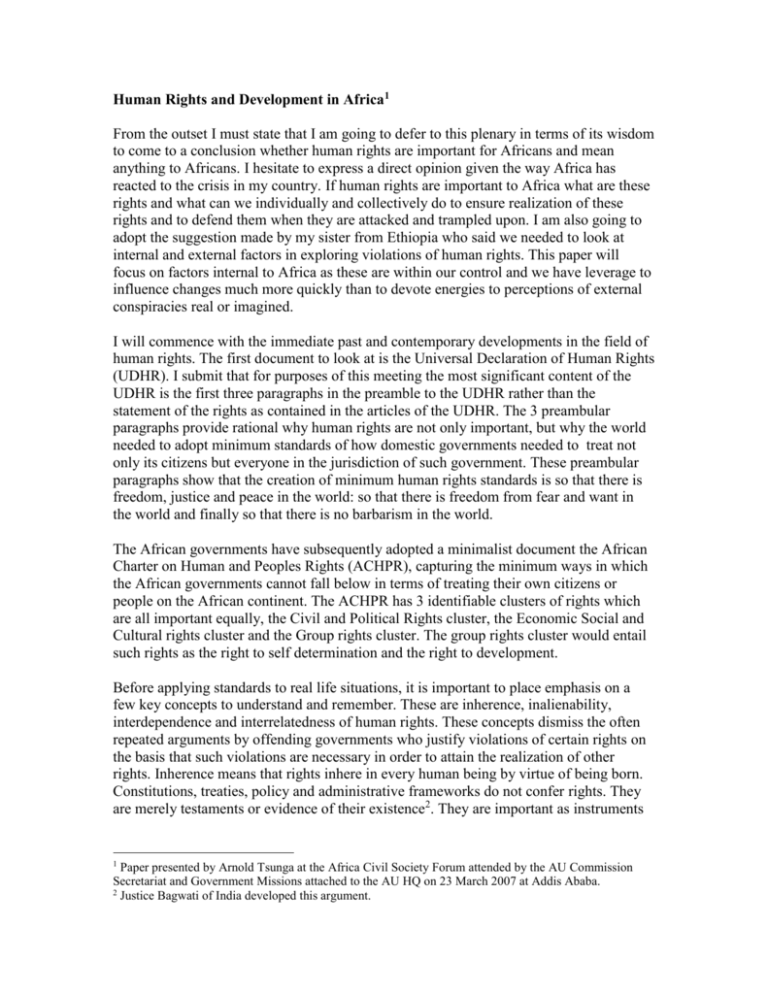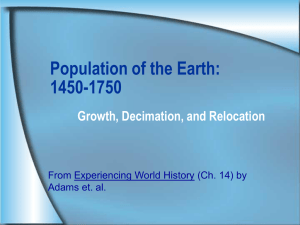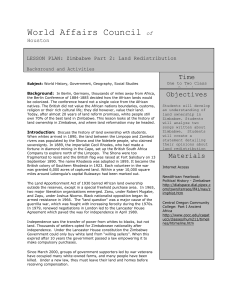Human Rights and Development in Africa
advertisement

Human Rights and Development in Africa1 From the outset I must state that I am going to defer to this plenary in terms of its wisdom to come to a conclusion whether human rights are important for Africans and mean anything to Africans. I hesitate to express a direct opinion given the way Africa has reacted to the crisis in my country. If human rights are important to Africa what are these rights and what can we individually and collectively do to ensure realization of these rights and to defend them when they are attacked and trampled upon. I am also going to adopt the suggestion made by my sister from Ethiopia who said we needed to look at internal and external factors in exploring violations of human rights. This paper will focus on factors internal to Africa as these are within our control and we have leverage to influence changes much more quickly than to devote energies to perceptions of external conspiracies real or imagined. I will commence with the immediate past and contemporary developments in the field of human rights. The first document to look at is the Universal Declaration of Human Rights (UDHR). I submit that for purposes of this meeting the most significant content of the UDHR is the first three paragraphs in the preamble to the UDHR rather than the statement of the rights as contained in the articles of the UDHR. The 3 preambular paragraphs provide rational why human rights are not only important, but why the world needed to adopt minimum standards of how domestic governments needed to treat not only its citizens but everyone in the jurisdiction of such government. These preambular paragraphs show that the creation of minimum human rights standards is so that there is freedom, justice and peace in the world: so that there is freedom from fear and want in the world and finally so that there is no barbarism in the world. The African governments have subsequently adopted a minimalist document the African Charter on Human and Peoples Rights (ACHPR), capturing the minimum ways in which the African governments cannot fall below in terms of treating their own citizens or people on the African continent. The ACHPR has 3 identifiable clusters of rights which are all important equally, the Civil and Political Rights cluster, the Economic Social and Cultural rights cluster and the Group rights cluster. The group rights cluster would entail such rights as the right to self determination and the right to development. Before applying standards to real life situations, it is important to place emphasis on a few key concepts to understand and remember. These are inherence, inalienability, interdependence and interrelatedness of human rights. These concepts dismiss the often repeated arguments by offending governments who justify violations of certain rights on the basis that such violations are necessary in order to attain the realization of other rights. Inherence means that rights inhere in every human being by virtue of being born. Constitutions, treaties, policy and administrative frameworks do not confer rights. They are merely testaments or evidence of their existence2. They are important as instruments 1 Paper presented by Arnold Tsunga at the Africa Civil Society Forum attended by the AU Commission Secretariat and Government Missions attached to the AU HQ on 23 March 2007 at Addis Ababa. 2 Justice Bagwati of India developed this argument. of recognition and for creating identifiable benchmarks to work with in the measurement of government performance in promotion and protection of human rights. I will use Zimbabwe as a case study for the current realities of what Africans view as human rights and how they care or do not care about human rights. What can we do as African CSO leaders about Zimbabwe? We need to help Zimbabwe to overcome its current challenges. The serious human rights deficit, the serious democracy deficit, the chronic governance failure. What can we do as Africans to help the government of Zimbabwe to disengage from its current low intensity warfare with its own people to the detriment of development? How can we help the government of Zimbabwe to come out of its state of denial where the following manifestations are self explanatory and completely incompatible with development possibilities and our sense of African values? Zimbabwe now has The sharpest declining economy in peace time in the world with the economy now in the 1950s; The biggest internally displaced persons in peace time with over 700 000 people having their homes destroyed around 2 years ago and rendering over 2.5 million homeless consequent to a direct state policy Operation Murambatsvina (literally meaning drive away the filth). The overwhelming number of these people remain homeless; The biggest forced external migration in peace time, over 4.5 million people pouring out of the country in about 5 years. South Africa is deporting around 20 000 Zimbabweans every month. Thousands of Zimbabweans are detained at Lindela camp waiting deportation. A significant number of Zimbabweans are unfortunately eaten by crocodiles while desperately crossing the crocodile infested limpopo river. They have been completely stripped of all human dignity; The lowest life span in the world, 33 years for women and 35 years for men; The highest death rate in the world with 3-4000 deaths per week. For comparative purposes this 16 000 deaths per month equates to the total number of Iraq deaths in one year (just over 16 000 in 2006) and yet the world is not at all shocked by the tragedy unfolding in Zimbabwe. Is it a wonder that it has now been termed a smart or gentle genocide? Human rights defenders and legitimate political opponents are routinely arbitrary arrested, detained and tortured by the police, the events of 11 March 2007 are a tip of an iceberg; Expropriations, corruption and parceling out of national assets through patronage and cliquism. What can we do as Africans and African civil society leaders about this bastardization of pan-Africanism? The silence on Zimbabwe is deafening. The impotence of the AU, Africans generally and us as African CSO leaders is shocking. The complicity of African politicians with cruel political leadership that has become positively dangerous for humanity is a shame to all of us as Desmond Tutu says. For example Angola is now sending 2 500 policemen to Zimbabwe to support a government that is increasingly autocratic and is at war with unarmed and peaceful civilians. Why? Are we really powerless as Africans when we are confronted with evil regimes? Is this the true African leadership that we aspire for in our continent? Are these the African standards? So much about Zimbabwe. Outside Zimbabwe, what has happened to elections in Ethiopia? So many people have died needlessly in this country. So many people are in jail after elections. Why Africa? Where is the leadership? In Uganda, what is happening to separation of powers? Why are soldiers being deployed into the Supreme Court to undermine separation of powers, effective checks and balances and accountability? Darfur, Sudan! Need I say more? Where is Africa’s human face? Where are African leaders; Political leaders, CSO leaders, Technocratic leaders and grassroots leaders? Do we have standards? Have we forgotten Rwanda, Burundi, Liberia, Cote Devoire, Sierra Leone and others? Why are we silent? How many more women men and children must die in Africa needlessly? Why are we not providing leadership? Let us restore the credibility of African leadership. Let us win the trust and confidence of those we lead domestically so that we can approach geopolitical contestations with integrity. Only this way do we stand a chance of being taken seriously. I will end my discussion on the importance of human rights to development by quoting Kofi Anan who in-fact answered this question very eloquently thus; "Unless Africa wholeheartedly embraces the inviolability of human rights, its struggle for security and development will not succeed. Many African governments are still resisting the responsibility to protect. Many, even among the most democratic, are still reluctant to play their role in the Human Rights Council by speaking out impartially against all abuses. They can, and must, do more." "[Blame] [for inaction in the face of serious human rights violations] can be shared among those who value abstract notions of sovereignty more than the lives of real families; those whose reflex of solidarity puts them on the side of governments and not of peoples; and those who fear that action to stop the slaughter [violations] would jeopardize their commercial interests."3 3 Kofi Anan in a goodbye speech at Lincoln Center, under the auspices of Human Rights Watch, reported by Nat Hentoff December 26th, 2006 2:15 PM






